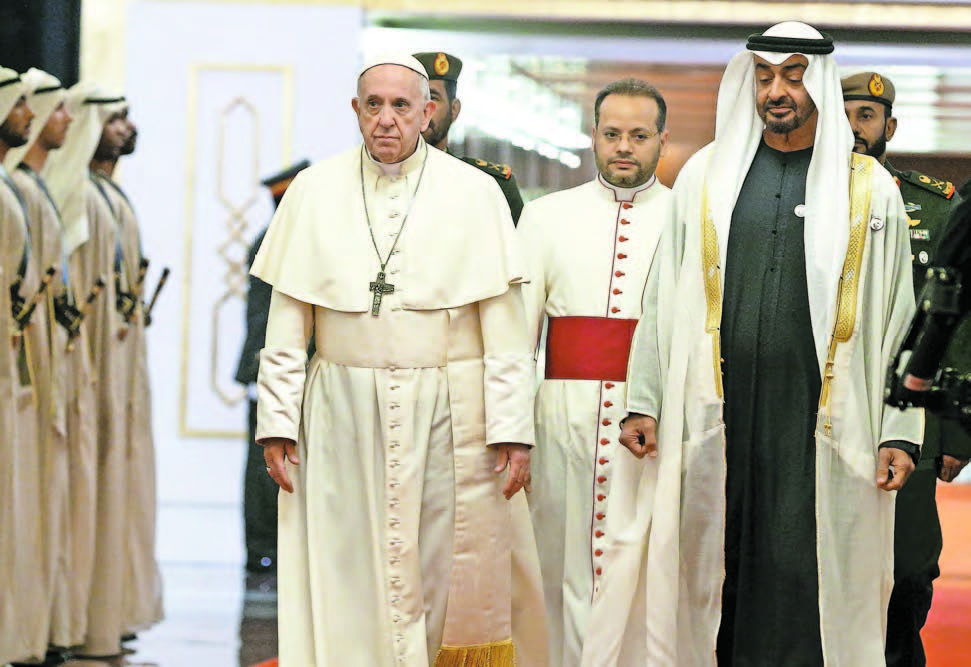
crown prince of the United Arab Emirates, upon his arrival at Abu Dhabi Presidential Flight airport in the
United Arab Emirates in 2019. (Photo: CNS/Paul Haring)
By Engy Magdy
CAIRO — Pope Francis’ call for human fraternity is not just idle talk, as we are used to hearing from the leaders in the Arab world, but rather a comprehensive approach that includes dialogue with and working for the millions of poor and needy in the region, which is rippling with political and economic turmoil.
It’s no wonder that Pope Francis clearly said in his message for the 2022 World Day of the Poor: “Where the poor are concerned, it is not talk that matters; what matters is rolling up our sleeves and putting our faith into practice through direct involvement, one that cannot be delegated.”
Human fraternity
The pope’s message to the Arab and Islamic world, “Human Fraternity,” inspired the name of an organization launched in Egypt recently to support poor families and spread the culture of fraternity and coexistence, said foundation head Msgr. Yoannis Lahzi Gaid in a telephone interview with The Tablet from his office in Rome.
Msgr. Lahzi Gaid is an Egyptian Coptic Catholic clergyman who served between April 2014 and August 2020 as the second personal secretary to Pope Francis. He is the first Eastern Catholic to hold that position.
The Human Fraternity Foundation was launched as a charitable organization under the supervision of the Egyptian government and aims to promote and spread the values and principles of the Human Fraternity Document signed by Pope Francis and Grand Imam of Al-Azhar Ahmed el-Tayeb.
The foundation runs five projects, helping poor families, orphans, the elderly, patients, and persons with special needs, in addition to working in the field of childhood and motherhood.
Five projects
According to Msgr. Lahzi Gaid, the five projects, which depend on donations, are: the Mercy House for Orphans, Bambino Gesù Maternity and Childhood Hospital, the Human Fraternity School for special needs, and medical convoys that tour villages and poor neighborhoods to treat children free of charge, and the Human Fraternity Restaurant.
Egypt is plagued by economic turmoil. The annual urban inflation rate reached a five-year high of 21.3% in December 2022, according to the latest report by the Central Agency for Public Mobilization and Statistics. The increase was driven by a 29.9% surge in food and beverage costs in a country where nearly a third of Egyptians live in poverty. Charities used to distribute food to those poor families through convoys that toured the streets of villages and marginalized areas.
Interfaith dialogue
“Human Fraternity Restaurant is born from the idea that food should be served in a way that respects a person’s dignity. We wanted to move away from the idea of distributing it [food] in packages on the street. Instead, we will offer it to needy families inside the restaurant where there will be a set menu that includes many meals,” said Msgr. Lahzi Gaid. The restaurant’s first branch will be opened in one of the poorer neighborhoods in Cairo, but there are plans to expand and open more throughout Egypt.
Pope Francis has made Christian-Islam dialogue a priority, as has been reflected in his visits to the Arab world, including the Holy Land and Jordan, Egypt, Morocco, the United Arab Emirates, Iraq, and Bahrain. “These visits illustrate the importance the pope gives to the Arab region, interfaith dialogue, and the need for rapprochement and coexistence to confront violence, divergence, terrorism, and hatred,” said Msgr. Lahzi Gaid.
Fifteen countries out of 50 where Christians face the most extreme persecution are Arab, according to Open Doors’ World Watch List annual ranking. Asked about the importance of the pope’s visits to Arab countries for the Christian minorities who live there, Msgr. Lahzi Gaid said: “Either we choose the culture of dialogue or the barbarism of non-dialogue. Either we build the future together, or there will be no future.”
“In the face of religious clashes in Egypt and elsewhere in recent years, the pope’s message and his visits to the Middle East and the Arab region is an affirmation of the essence and importance of building the future together, otherwise there will be no future,” Msgr. Lahzi Gaid said.
“I believe that one of the most important fruits of the pope’s visits is the document of ‘Human Fraternity,’ and I see a significant decline in the number of violent attacks against Christians in the region compared to the past 10 years.”
Climate change
While developed countries are the main contributors to the climate crisis, due to carbon emissions that lead to global warming, poor countries are the most affected. Therefore, there is an urgent need to address climate injustice. Pope Francis’ encyclical, “Laudato Si’,” says that solving climate change means protecting the planet and vulnerable people, and we must hear “both the cry of the earth and the cry of the poor.”
“The encyclical ‘Laudato Si’ ’ is a message about the common home,” Msgr. Lahzi Gaid said. “The globe is our common home because it is our common home that we all must participate in preserving. His Holiness the pope considers the issue of preserving the environment one of the important issues to which he attaches great importance.”
He added, “I invite everyone to read it because it is directed not only to Christians or Catholics but to all humans. The pope gives it to all heads of state and delegations that come to the Vatican. He always presents ‘Laudato Si’ ’ and ‘Fratelli Tutti’ along with the Human Fraternity (document), because the three illustrate an important aspect of the pope’s work in preserving the environment, fraternity, and dialogue.”
